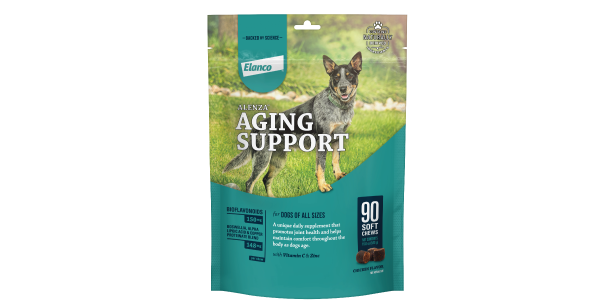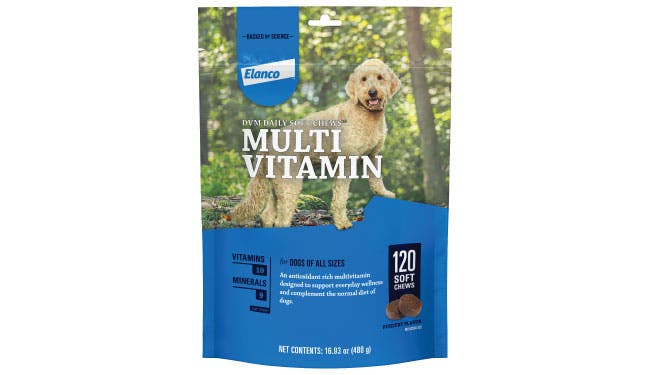As your dog ages, they may need additional support from supplements to maintain optimal health in their older years.
By Donna M. Raditic, DVM, DACVN
As dogs age, the level of nutrients that they need to function at optimal health can change. The aging process may create imbalances that require additional support from supplements. Supplements with specific nutrients, antioxidants, omega-3 fatty acids, or prebiotics and probiotics can help complement your dog's daily needs.
Are You Noticing Aging Changes in Your Dog?
The aging process may create imbalances that require additional support from supplements to help maintain your dog's optimal health. Aging can impact a dog's musculoskeletal system, digestive tract, immune system, kidneys, and other organs.
You may be noting some of these aging changes as one or more of the following symptoms in your dog:
- Slowing down
- Joint stiffness and discomfort
- Dry coat or flaky skin
- Difficulty getting up or climbing stairs
- Digestive upset or imbalance
Supplements Can Help Maintain Healthy Body Systems
Free radicals are highly reactive compounds that the body produces when it uses nutrients. Normally, free radical compounds are easily "neutralized" by the body's antioxidant defense systems. However, if they build up because of excess production and/or depleted antioxidants, free radicals can damage body tissues and even DNA.
The build-up of free radicals, combined with a decline in the body's antioxidant defense systems to neutralize them is called "oxidative stress." Seen with trauma, diseases, certain drugs, and ultraviolet (UV) radiation, oxidative stress is also believed to be a primary driver in aging.
Supplements that contain antioxidants, such as vitamin C, zinc, and flavonoids, may help decrease free radical tissue damage. Some dog supplements that support the health and function of many organs and tissues, including the brain, heart, kidneys, and joints, also contain free radical fighting antioxidants.
Supplements Can Help Support an Aging Dog’s Brain
Similar to human aging, dogs can experience decline in brain and nervous system functions. Veterinarians refer to this as "cognitive dysfunction,” and it can affect dogs as young as 8 years of age.
While a number of health factors are at play in a pet's declining cognitive ability, a common culprit is free radical damage. As free radicals accumulate with age, they can affect the highly sensitive and specialized brain and nervous tissues, causing our pets to become senile, seem confused, or just not themselves. Supplements that contain antioxidants or omega-3 fatty acids can support normal nerve and brain function in aging dogs.

Supplements Can Help Promote a Dog’s Healthy Joints
Joint supplements contain specific nutrients that are the building blocks for healthy muscles, bone, cartilage, synovial fluid, and connective tissues. Veterinarians may recommend joint supplements that contain glucosamine, chondroitin sulfate, creatine, MSM, turmeric, zinc, and selenium to help maintain mobility and joint health.
Omega-3 fatty acids are vital to everyday health, immune function, and healthy joints. The omega-3 fatty acids found in fish oil supplements may help relieve inflammation and occasional soreness associated with exercise, activity, and training, as well as promote everyday health and immune function.
Supplements Can Help Support Good Digestive Health
The gut microbiota is composed of trillions of beneficial bacteria that live in the digestive tract and support digestive function and immune health. Fiber is a special type of carbohydrate that promotes normal bowel function and helps maintain a proper gut microbiota. Specific fiber types often found in canine gastrointestinal (GI) supplements are called prebiotics. Prebiotic supplements may also contain probiotics, which are a source of beneficial intestinal bacteria. Together, prebiotics and probiotics may be used to support your dog's healthy GI and immune system.
How Can You Help Your Dog Maintain Optimal Health?
Ask your veterinarian which supplements could benefit your canine companion.
About the Expert:
Dr. Donna M. Raditic completed her Doctorate of Veterinary Medicine at Cornell’s College of Veterinary Medicine. She was a Professor for the Nutrition and the Integrative Medicine Services at the University of Tennessee College of Veterinary Medicine and now publishes and lectures nationally and internationally on nutrition, supplements and integrative veterinary medicine. A veterinary nutritionist, integrative practitioner, to academic professor, she offers unique perspectives on the role of nutrition and integrative care for companion animals.

Alenza® Aging Support
A unique daily supplement that promotes joint health and helps maintain comfort throughout the body as dogs age.

DVM Daily Soft Chews® Multivitamin
A daily multivitamin soft chew containing minerals and antioxidants to supplement your dog's daily nutritional needs.







